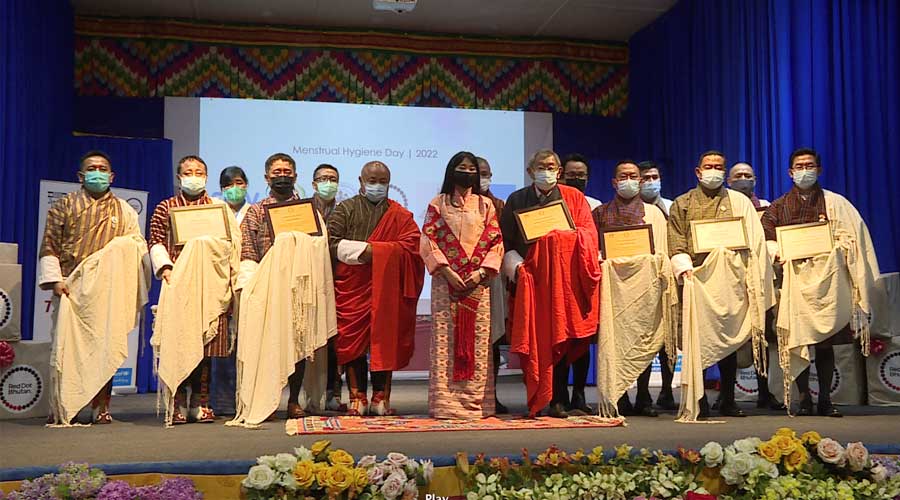
As Bhutan joined the global community to mark the Menstrual Hygiene Day today, the Red Dot Bhutan called for men and boys to take lead in breaking social taboos and myths concerning menstruation.
The Patron of the Red Dot Bhutan, Her Royal Highness the Princess Eeuphelma Choden Wangchuck urged them to normalise conversations surrounding menstruation and its hygiene management.
Observing the Menstrual Hygiene Day at the Motithang School in Thimphu, Her Royal Highness awarded certificates of appreciation to men, who have supported the Red Dot Bhutan in bolstering awareness of menstrual health and hygiene.
Under the patronage of Her Royal Highness, the Red Dot Bhutan, however, encourages more participation of men and boys to speak openly about menstruation and empower girls and women to practice good menstrual hygiene.
“Often we get to hear that men are not supportive about it. As for women, they understand the pain they go through, and the odd situation they go through. So I think men should be supportive during the time of menstruation,” asserted Karma Wangchuk, the Chief of School Health and Nutrition Division with the education ministry.
He went on to add that girls, who go through the menstruation phase, should be empowered to practice effective management of menstrual hygiene:
“Some studies show that some children are not sent to school during the times of menstruation, missing their classes, so we would like to urge our parents to send our children to the school during the time of menstruation, it’s nothing abnormal.”
The Red Dot Bhutan also committed to supporting WASH meaning Water, Sanitation and Hygiene facilities for girls and women with disabilities in the country.
Red Dot Bhutan is a campaign to raise awareness of issues relating to menstrual hygiene and address challenges related to menstruation faced by many girls and women in the country.
Such a commitment was made in presence of students of 10 schools under Thimphu Thromde and nuns from Zilukha Anim Dratshang at the event.
The joint press release from the UNICEF Bhutan and the education ministry pointed out that the commitment will ensure inclusive menstrual hygiene management across all sectors.
According to the 2018 Knowledge, Attitude and Practices Study on Menstrual Hygiene Management for school girls and nuns in the country, teachers have advised parents to keep their girls with special needs at home during the menstruation period.
This is because the schools were not adequately equipped with facilities to support them.
Today, there are 33 schools with more than 860 students with special educational needs.
Of them, almost 500 are girls and out of 33 schools, 24 are designated as inclusive schools or schools with special education needs (SEN) programmes.
“Considering the needs for inclusive toilets and WASH facilities in SEN schools, the School Health and Nutrition Division in partnership with the UNICEF Bhutan, the Special Educational Needs Programme and School infrastructure and Development will construct five inclusive toilets,” the joint press release stated.
The inclusive WASH facilities will include provisions to address menstrual hygiene management for girls with special needs.
Bhutan’s persistent campaigns on menstrual hygiene have led to the government exempting taxes on menstrual sanitary products.
Bhutan first marked the Menstrual Hygiene Day in 2015.
Choni Dema
Edited by Pema Laden









